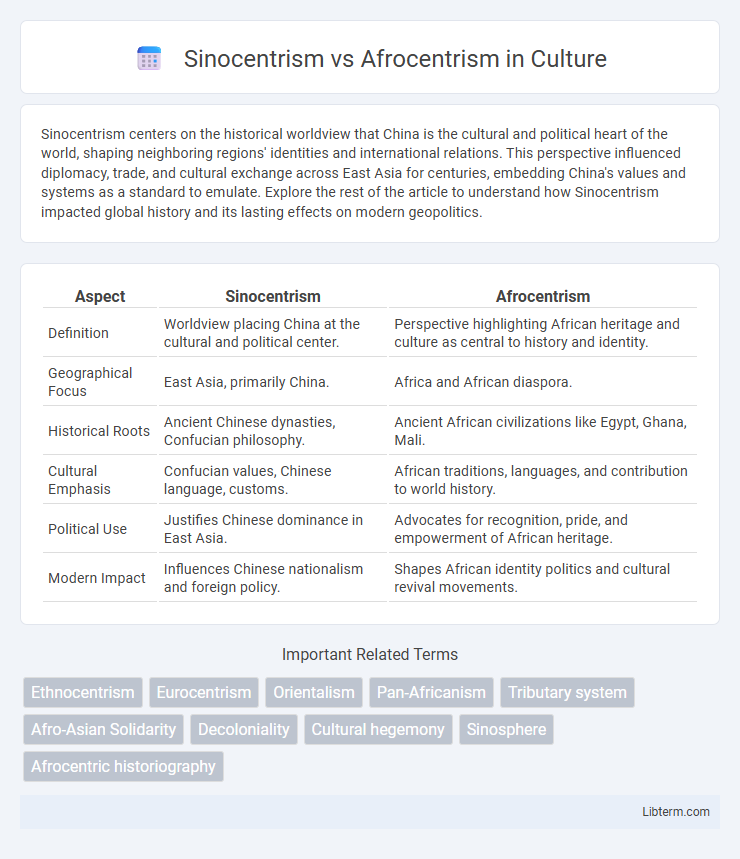Sinocentrism centers on the historical worldview that China is the cultural and political heart of the world, shaping neighboring regions' identities and international relations. This perspective influenced diplomacy, trade, and cultural exchange across East Asia for centuries, embedding China's values and systems as a standard to emulate. Explore the rest of the article to understand how Sinocentrism impacted global history and its lasting effects on modern geopolitics.
Table of Comparison
| Aspect | Sinocentrism | Afrocentrism |
|---|---|---|
| Definition | Worldview placing China at the cultural and political center. | Perspective highlighting African heritage and culture as central to history and identity. |
| Geographical Focus | East Asia, primarily China. | Africa and African diaspora. |
| Historical Roots | Ancient Chinese dynasties, Confucian philosophy. | Ancient African civilizations like Egypt, Ghana, Mali. |
| Cultural Emphasis | Confucian values, Chinese language, customs. | African traditions, languages, and contribution to world history. |
| Political Use | Justifies Chinese dominance in East Asia. | Advocates for recognition, pride, and empowerment of African heritage. |
| Modern Impact | Influences Chinese nationalism and foreign policy. | Shapes African identity politics and cultural revival movements. |
Understanding Sinocentrism: Origins and Core Principles
Sinocentrism originates from ancient China's worldview, positioning China as the cultural and political center of East Asia, influencing tributary relations and diplomatic strategies. Core principles include the belief in the superiority of Chinese civilization, Confucian values as the ideal societal model, and the emperor's role as the "Son of Heaven" who governs with a mandate from heaven. This framework shaped regional interactions, emphasizing hierarchical order and cultural assimilation, contrasting with Afrocentrism's focus on African cultural unity and historical reclamation.
Tracing the Roots of Afrocentrism
Afrocentrism traces its roots to the early 20th century Pan-Africanist movements, emphasizing African history and culture as central to global civilization. This ideological framework counters Eurocentric narratives by reclaiming African contributions and perspectives, promoting pride and empowerment within the African diaspora. Afrocentrism's development contrasts with Sinocentrism's historical focus on China's cultural and political centrality in East Asia, highlighting differing regional philosophies on identity and heritage.
Historical Contexts Shaping Sinocentrism and Afrocentrism
Sinocentrism emerged from China's historical role as the dominant political, cultural, and economic power in East Asia, centered on the Middle Kingdom's imperial tributary system and Confucian ideology. Afrocentrism developed in response to centuries of African marginalization under colonialism and Eurocentric narratives, emphasizing African civilizations' historical significance and cultural contributions. Both frameworks are deeply rooted in their unique historical contexts, shaping collective identity and worldview by reclaiming regional prominence and intellectual legacy.
Key Figures in Sinocentric and Afrocentric Thought
Key figures in Sinocentrism include Confucius, whose teachings shaped Chinese cultural and political ideals emphasizing harmony and hierarchical order, and Zheng He, whose voyages asserted Chinese supremacy in the Indian Ocean. In Afrocentrism, scholars like Cheikh Anta Diop challenged Eurocentric historical narratives by highlighting Africa's contributions to civilization, while Molefi Kete Asante developed Afrocentric theory emphasizing African identity and cultural pride. Both Sinocentric and Afrocentric thought revolve around reclaiming cultural identity and asserting the centrality of their regions in global history.
Influence on Politics and Governance
Sinocentrism shaped East Asian political systems by promoting hierarchical governance models centered on Confucian values and the Chinese emperor's moral authority, influencing neighboring countries like Korea, Japan, and Vietnam. Afrocentrism impacts politics by advocating for African-centered leadership and governance frameworks that challenge colonial legacies and emphasize indigenous political philosophies such as Ubuntu, emphasizing community and collective responsibility. Both ideologies influence modern governance by reinforcing cultural identity and affecting policy-making through their respective historical and philosophical lenses.
Impact on Cultural Identity and Heritage
Sinocentrism emphasizes East Asian cultural supremacy, profoundly shaping Chinese identity through Confucian values and historical narratives that center China as the "Middle Kingdom," influencing neighboring cultures and regional geopolitics. Afrocentrism reclaims African heritage by challenging Eurocentric histories, fostering pride in African civilizations like Egypt and promoting cultural renaissance across the African diaspora to restore linguistic, artistic, and spiritual traditions. Both frameworks impact cultural identity by reinforcing pride and continuity in their respective heritages, shaping collective memory and socio-political movements that seek to preserve and celebrate indigenous cultural contributions.
Sinocentrism and Afrocentrism in Education Systems
Sinocentrism in education emphasizes Confucian values, prioritizing respect for authority, collective harmony, and rigorous academic discipline, shaping curricula across East Asia. Afrocentrism promotes African history, culture, and philosophical perspectives to counter Eurocentric biases, fostering cultural pride and identity in education systems globally. Both frameworks influence pedagogical approaches, curriculum content, and student identity formation, reflecting broader socio-political aims within their respective regions.
Debates on Global Narratives and Historical Perspectives
Sinocentrism, rooted in ancient Chinese civilization, promotes East Asia as the cultural and political center, influencing historical narratives that prioritize Chinese innovation and governance models. Afrocentrism challenges Eurocentric and Sinocentric perspectives by emphasizing African contributions to world history, seeking to reclaim African identity and reshape global narratives around African achievements and experiences. Debates between these perspectives highlight contrasting views on civilization development, historical agency, and the role of cultural heritage in shaping current global power structures.
Contemporary Manifestations and Challenges
Sinocentrism today is evident in China's Belt and Road Initiative, which reasserts Chinese cultural and economic influence across Asia and Africa, while facing challenges from global skepticism and regional resistance. Afrocentrism manifests in the reclaiming of African history, identity, and cultural pride through movements like Afrofuturism and Pan-Africanism, confronting obstacles such as ongoing systemic racism and Western cultural dominance. Both ideologies navigate complex geopolitical dynamics, cultural revitalization efforts, and the contestation of historical narratives in the contemporary global arena.
Toward Cross-Cultural Dialogue: Bridging Sinocentrism and Afrocentrism
Sinocentrism, emphasizing China's historical cultural dominance and Afrocentrism, which centers African heritage and contributions, both shape identity and worldview in their respective regions. Bridging these perspectives fosters a cross-cultural dialogue promoting mutual understanding, reducing ethnocentrism, and encouraging collaboration on shared global challenges. Integrating Sinocentric values of harmony and Afrocentric principles of resilience can create a framework for intercultural respect and cooperative development.
Sinocentrism Infographic

 libterm.com
libterm.com